
How to Use YX5300 MP3 Player Module: Examples, Pinouts, and Specs
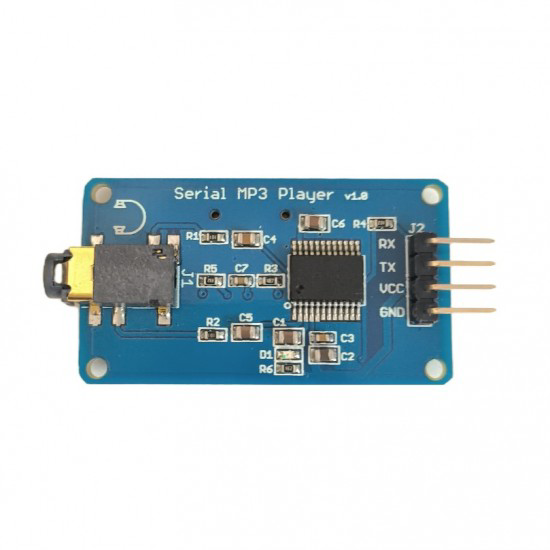
 Design with YX5300 MP3 Player Module in Cirkit Designer
Design with YX5300 MP3 Player Module in Cirkit DesignerIntroduction
The YX5300 MP3 Player Module is a compact and versatile audio playback module manufactured by Yuanze Semiconductor. It is designed to simplify the integration of audio functionality into electronic projects. The module supports MP3 and WAV audio formats and features a built-in microSD card slot for audio file storage. It can be controlled via UART serial communication, making it compatible with microcontrollers like Arduino, Raspberry Pi, and other embedded systems.
Explore Projects Built with YX5300 MP3 Player Module
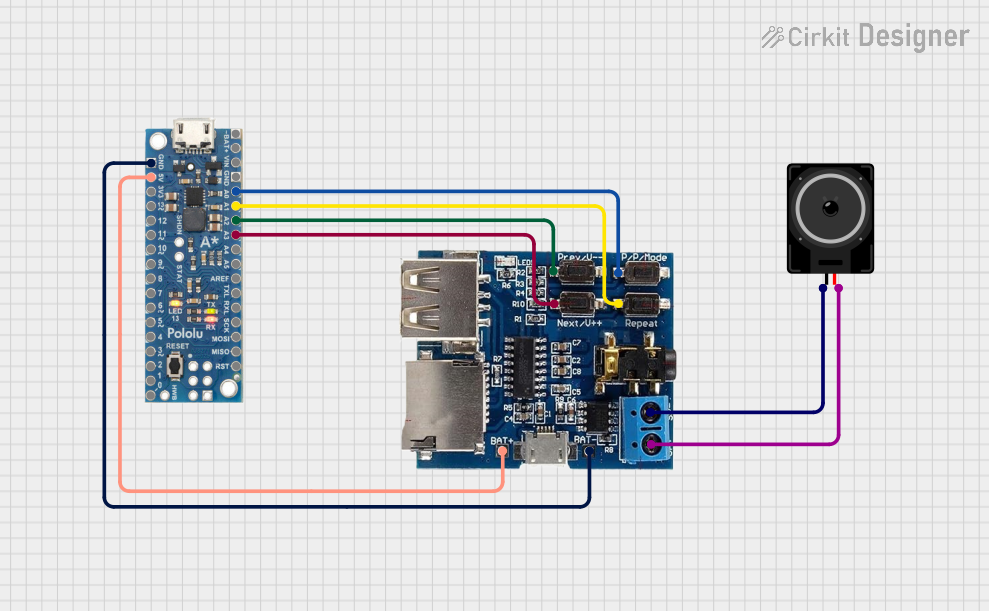
 Open Project in Cirkit Designer
Open Project in Cirkit Designer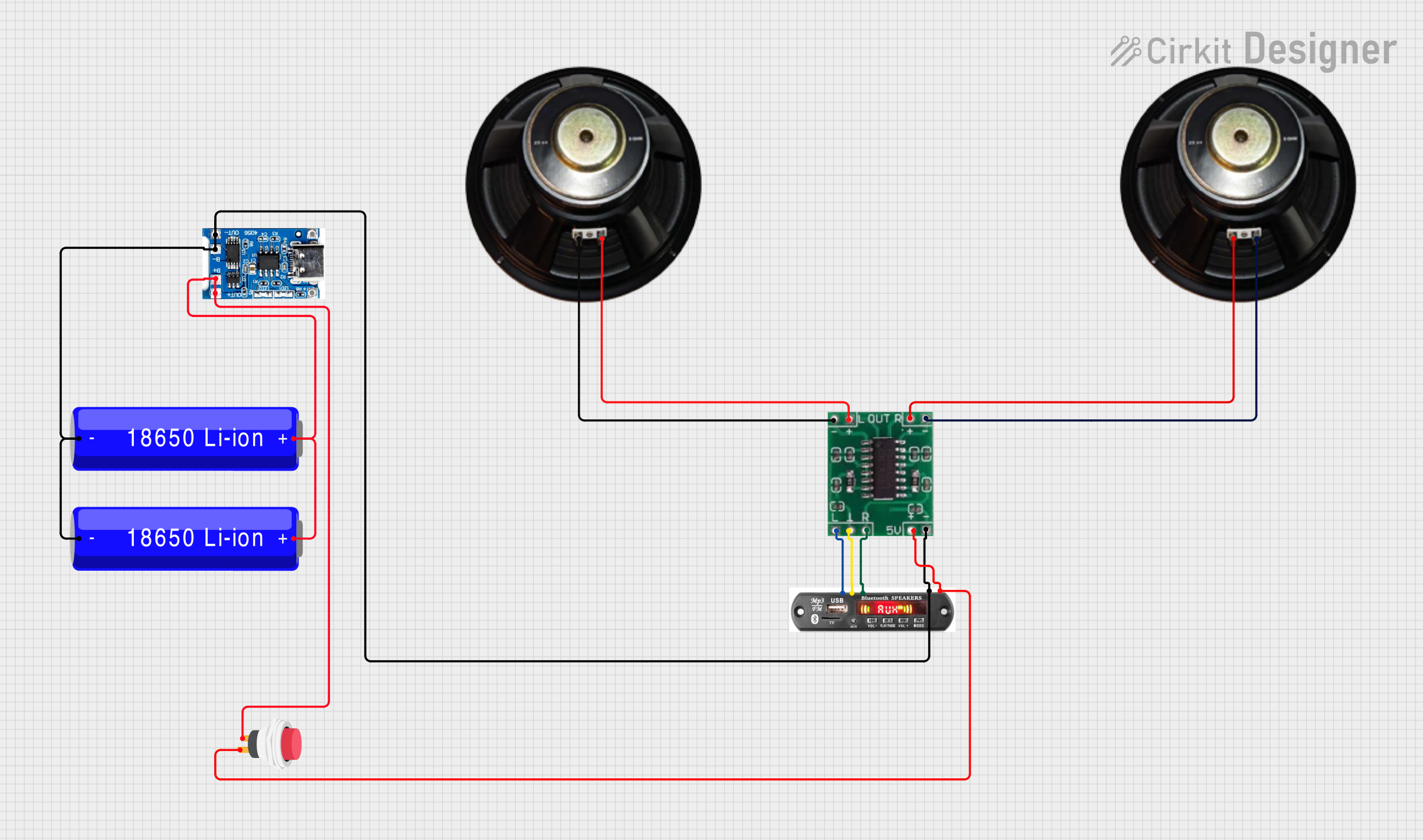
 Open Project in Cirkit Designer
Open Project in Cirkit Designer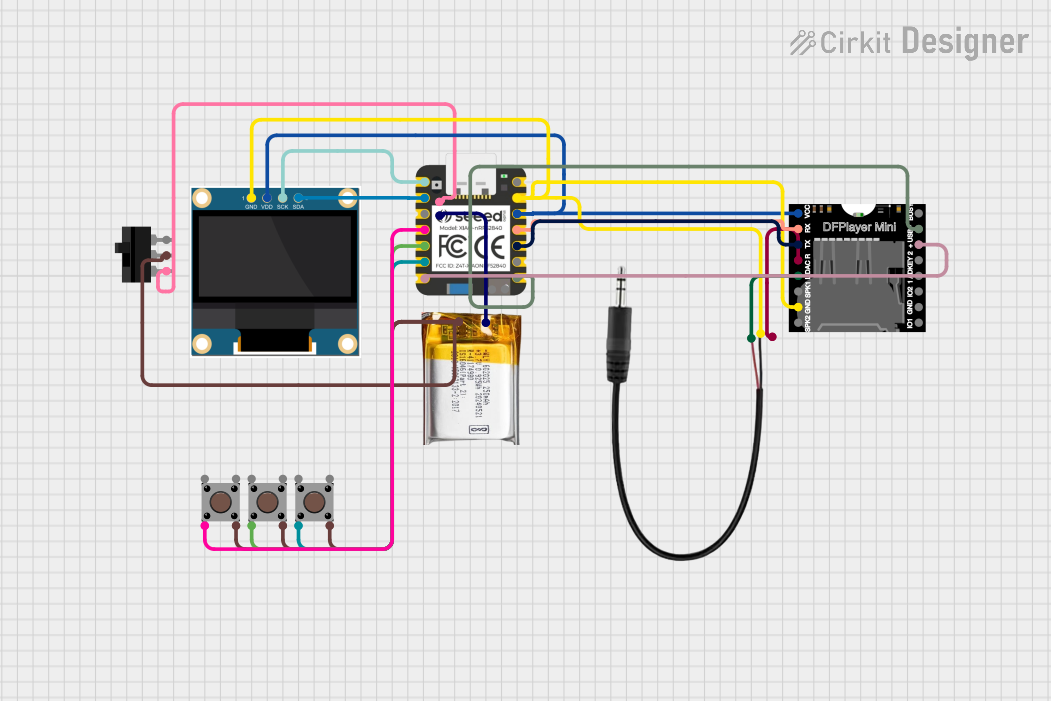
 Open Project in Cirkit Designer
Open Project in Cirkit Designer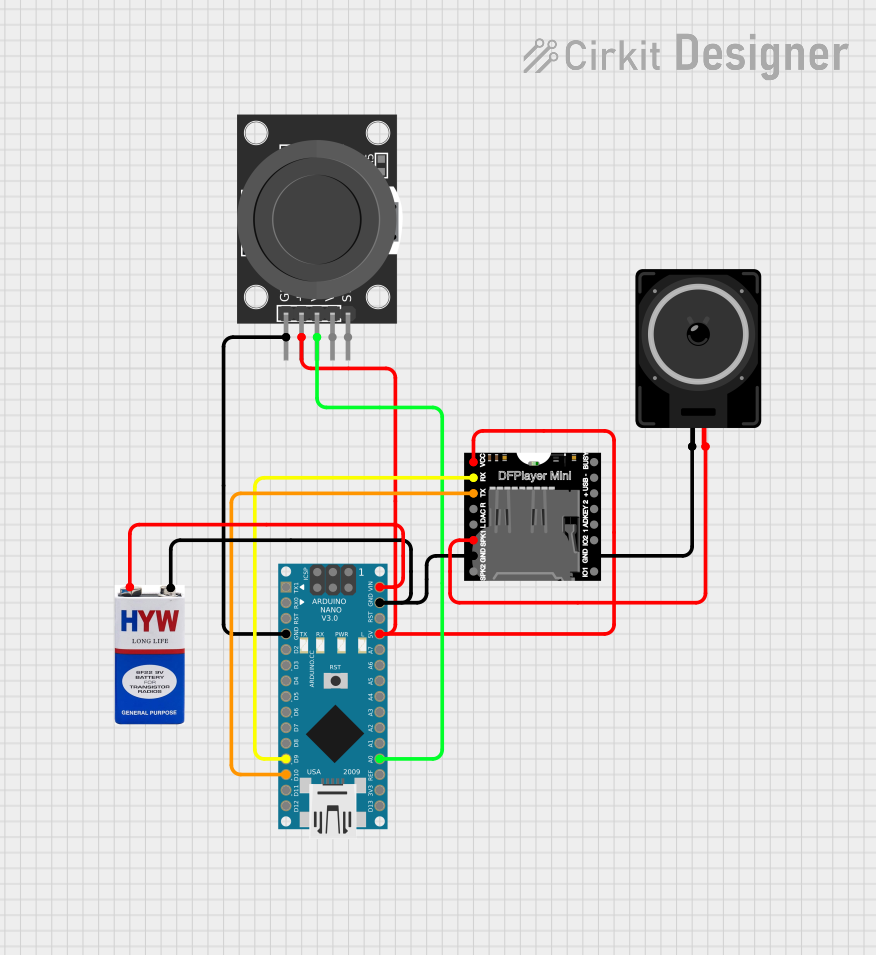
 Open Project in Cirkit Designer
Open Project in Cirkit DesignerExplore Projects Built with YX5300 MP3 Player Module

 Open Project in Cirkit Designer
Open Project in Cirkit Designer
 Open Project in Cirkit Designer
Open Project in Cirkit Designer
 Open Project in Cirkit Designer
Open Project in Cirkit Designer
 Open Project in Cirkit Designer
Open Project in Cirkit DesignerCommon Applications
- Audio playback in IoT devices
- Voice prompts and notifications in embedded systems
- Interactive kiosks and vending machines
- Educational and hobbyist projects
- Alarm and alert systems
Technical Specifications
The following table outlines the key technical details of the YX5300 MP3 Player Module:
| Parameter | Specification |
|---|---|
| Operating Voltage | 3.2V to 5.0V |
| Communication Interface | UART (9600 bps default baud rate) |
| Audio Formats Supported | MP3, WAV |
| Storage | MicroSD card (up to 32GB, FAT16/FAT32) |
| Output | Stereo audio output, built-in amplifier |
| Power Consumption | < 20mA (idle), < 100mA (playback) |
| Dimensions | 45mm x 36mm x 7mm |
Pin Configuration and Descriptions
The YX5300 module has a total of 6 pins. The table below describes each pin:
| Pin | Name | Description |
|---|---|---|
| 1 | VCC | Power supply input (3.2V to 5.0V). Connect to the 5V pin of your microcontroller. |
| 2 | GND | Ground connection. Connect to the ground of your circuit. |
| 3 | TX | UART Transmit pin. Sends data to the microcontroller. |
| 4 | RX | UART Receive pin. Receives data from the microcontroller. |
| 5 | SPK1 | Speaker output 1. Connect to one terminal of a speaker. |
| 6 | SPK2 | Speaker output 2. Connect to the other terminal of a speaker. |
Usage Instructions
How to Use the YX5300 in a Circuit
- Power the Module: Connect the
VCCpin to a 5V power source and theGNDpin to ground. - Connect to a Microcontroller:
- Connect the
TXpin of the YX5300 to theRXpin of the microcontroller. - Connect the
RXpin of the YX5300 to theTXpin of the microcontroller.
- Connect the
- Audio Output:
- For speaker output, connect a small speaker (4Ω or 8Ω) to the
SPK1andSPK2pins. - Alternatively, use the stereo audio output pins (if available) for external amplifiers or headphones.
- For speaker output, connect a small speaker (4Ω or 8Ω) to the
- Insert a microSD Card:
- Format the microSD card to FAT16 or FAT32.
- Load MP3 or WAV files onto the card and insert it into the module's slot.
- Control the Module:
- Use UART commands to control playback, volume, and track selection.
Important Considerations and Best Practices
- Ensure the microSD card is properly formatted and contains supported audio files.
- Use a level shifter if your microcontroller operates at 3.3V logic levels to avoid damaging the module.
- Avoid connecting high-power speakers directly to the module; use an external amplifier if needed.
- Keep the UART communication baud rate at 9600 bps unless reconfigured.
Example Code for Arduino UNO
Below is an example of how to control the YX5300 module using an Arduino UNO:
#include <SoftwareSerial.h>
// Define RX and TX pins for SoftwareSerial
SoftwareSerial mp3Serial(10, 11); // RX = Pin 10, TX = Pin 11
void setup() {
mp3Serial.begin(9600); // Initialize serial communication with the module
Serial.begin(9600); // Initialize serial monitor for debugging
delay(500); // Allow the module to initialize
// Send command to play the first track
playTrack(1);
}
void loop() {
// Add your logic here (e.g., play next track, pause, etc.)
}
// Function to send a command to play a specific track
void playTrack(uint16_t trackNumber) {
uint8_t command[] = {0x7E, 0xFF, 0x06, 0x03, 0x00,
(uint8_t)(trackNumber >> 8),
(uint8_t)(trackNumber & 0xFF), 0xEF};
sendCommand(command, sizeof(command));
}
// Function to send a command to the YX5300 module
void sendCommand(uint8_t *command, uint8_t length) {
for (uint8_t i = 0; i < length; i++) {
mp3Serial.write(command[i]);
}
}
Notes on the Code
- The
playTrack()function sends a command to play a specific track by its number. - The command format follows the YX5300 protocol, which uses a fixed structure for UART communication.
- Ensure the RX and TX pins are correctly connected to the Arduino.
Troubleshooting and FAQs
Common Issues and Solutions
No Sound Output:
- Verify the speaker connections to
SPK1andSPK2. - Check that the microSD card is properly inserted and contains supported audio files.
- Ensure the module is receiving power (3.2V to 5.0V).
- Verify the speaker connections to
Module Not Responding to Commands:
- Confirm the RX and TX connections between the module and microcontroller.
- Ensure the UART baud rate is set to 9600 bps.
- Check for loose or incorrect wiring.
Audio Playback is Distorted:
- Use a speaker with the recommended impedance (4Ω or 8Ω).
- Avoid overdriving the module by connecting high-power speakers directly.
MicroSD Card Not Recognized:
- Format the card to FAT16 or FAT32.
- Ensure the card capacity does not exceed 32GB.
FAQs
Q: Can the YX5300 play audio files in formats other than MP3 or WAV?
A: No, the module only supports MP3 and WAV formats.
Q: What is the maximum number of tracks the module can handle?
A: The module can handle up to 255 tracks in a single folder.
Q: Can I use the YX5300 with a 3.3V microcontroller?
A: Yes, but you should use a level shifter to safely interface the UART pins.
Q: Is it possible to control the volume programmatically?
A: Yes, the module supports UART commands to adjust the volume.
Q: Does the module support playback from USB drives?
A: No, the YX5300 only supports playback from microSD cards.